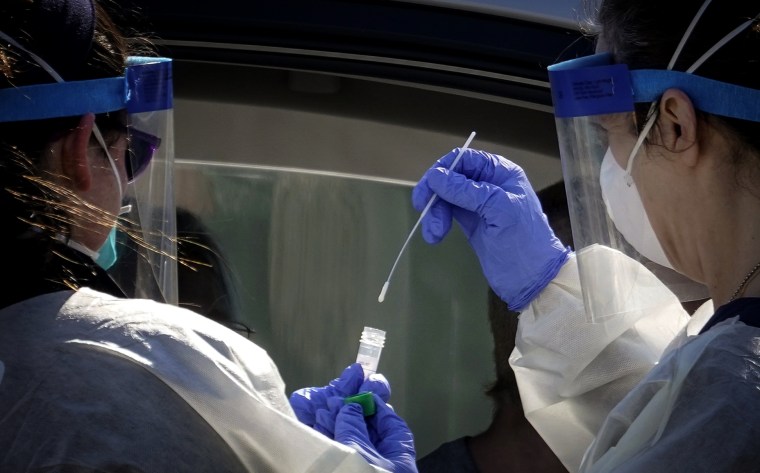Whether the Trump administration's guidance to reopen portions of the country is successful hinges on diagnostic testing: people need to know whether they're healthy enough to get back to work, or sick with COVID-19 and need continued isolation.
It's a necessity Vice President Mike Pence acknowledged during a coronavirus task force briefing Thursday at the White House.
Full coverage of the coronavirus outbreak
"Our administration will continue to work day in and day out," he said, "to ensure that our states have not only the medical supplies, but that we continue to rapidly expand testing across the nation."
But primary care doctors across the country say they have nowhere near the level of testing supplies needed to meet what is sure to be increased demand for coronavirus testing.
"We're here on the front line of this doggone thing," Dr. Gary LeRoy, president of the American Academy of Family Physicians, told NBC News. Patients naturally turn to their primary care doctors first when they are ill, making it critical those practices have access to testing kits.
But in a survey of 2,602 family physicians nationwide, one third said they had no ability to test for COVID-19, the disease caused by the virus. The survey was released Friday from the Primary Care Collaborative, a nonprofit organization for primary care groups, and a research group called the Larry A. Green Center.
Another third reported having only limited capacity for diagnostic testing. More than half reported a lack of personal protective equipment.
"We are concerned," LeRoy, who is also a practicing physician at the East Dayton Health Clinic in Dayton, Ohio, said, adding that accurate testing is the key to understanding asymptomatic spread of the coronavirus, as well.
"If you start testing more, you would find that you actually have more people walking around thinking that they don't have this," LeRoy said. "They're Trojan horses carrying this virus from person to person to person to person."
"You need to know how many Trojan horses you have out there before you open things up."
You need to know how many Trojan horses you have out there before you open things up.
Private labs are increasingly able to offer testing, according to the American Clinical Laboratory Association, an industry trade group.
However, those labs are still largely faced with shortages of supplies, such as testing swabs and chemical reagents, and are therefore unable to do mass testing of asymptomatic individuals in the general public.
In the Washington, D.C., area, AllCare Family Medicine has managed to set up several drive-thru testing sites for its patients, though finding enough supplies has not been easy.
Personal protective equipment and even the tubes needed to store swab samples became "very hard to come by," Victor Zakaryan, medical director for AllCare Family Medicine, said.
Zakaryan said his group was unable to get enough equipment from local health departments, turning instead to private companies and importing gowns and masks necessary to keep clinicians safe while performing the nasal swab testing.
"Before we started the testing, we had a couple of nights that we didn't sleep to come up with the testing protocol," he said. "If we were going to do this, we had to get it right."
Download the NBC News app for full coverage of the coronavirus outbreak
But many physicians' offices acknowledge that they can't do the testing themselves. Instead, they're trying to screen patients for COVID-19 symptoms well before patients arrive for appointments — and then send them elsewhere.
Patients of Atrium Health System in Charlotte, North Carolina, must answer a series of questions about their health status before making an appointment, an effort to triage potential coronavirus patients to special drive-through testing not performed in offices.
It's the same situation on the West Coast, where some family doctors say they remain busy with regular patients, despite an inability to test for the coronavirus.
"We don't do COVID testing because of safety. We're just wearing masks and gloves," Dr. Rajsree Nambudripad, a primary care physician at St. Jude Medical Center in Fullerton, California, said.
"We don't have that high level of safety for ourselves." If Nambudripad determines a patient needs to be tested for COVID-19, she recommends a trip to the hospital or an urgent care clinic.
Making these triage decisions more difficult for physicians is that the criteria for which patients should be tested changes daily. New potential symptoms emerge constantly; now including nausea, diarrhea, delirium, even skin changes.
And there is no single set of consistent criteria; it can be different at each hospital system, local health department or state health department.
LeRoy, the AAFP president, said he woke up recently to three new pages of testing criteria. "You finally get into your head what to do and how to order the test, and now here's three pages of stuff you have to read to figure out how to appropriately order the testing."
"I don't have time to read all this stuff," he said.


